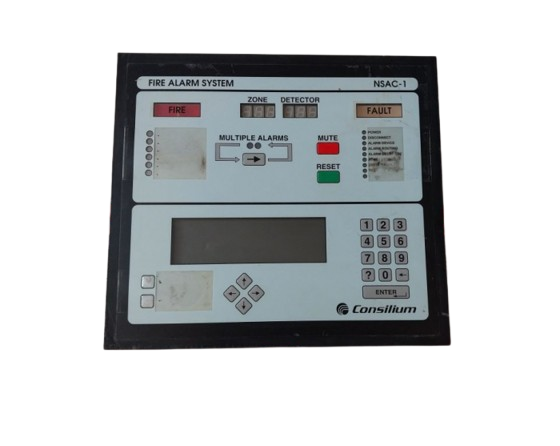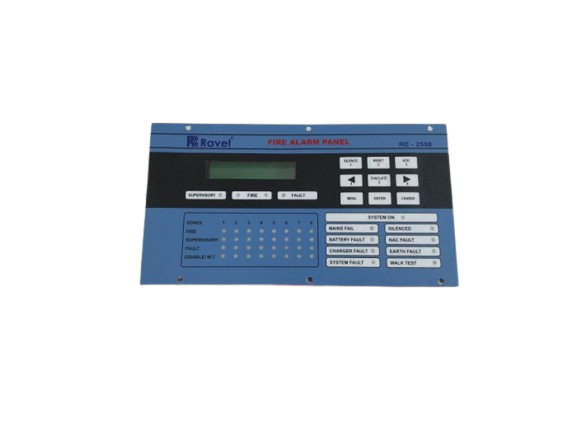Fire safety is definitely one of the most important things that any maritime vessel should observe. Advanced automation systems in marine environments have made the integration of fire alarm systems vital for efficient and effective fire detection, prevention, and response. Modern fire alarm systems can be integrated into marine automation, which uses computerized systems to control and monitor different vessel operations. These systems provide actual time alerts, auto-actions as well as remote monitoring and become a necessity to maintain safe standards onboard.
Fire Alarm System in Marine Automation

A fire alarm is an especially prepared system to sense the presence of fire or smoke in buildings or areas. In a ship, such systems form a bigger automation framework controlling many vital functions ranging from navigation to power or communications. In marine automation, the role of fire alarms is also very important to discover the fire at its earliest stages so that the crew has ample time to react and not let it worsen. With the risk of fire being quite high at sea, particularly in confined spaces such as an engine room, cargo holds, and electrical rooms, it is the difference between life and death that an efficient fire alarm system can make. They can pick up early signs of fire such as smoke, heat, or gas emissions and alert the crew immediately.
Components of Fire Alarm Systems in Marine Automation
The basic elements of the marine automation fire alarm systems include a set of interacting elements providing full fire protection. Smoke detectors detect smoke particles suspended in the air and are generally the first sign of a fire. They are installed aboard ships at points where smoke could potentially be produced, such as at the intake ends of ventilation ducts or near the location of fuel storage tanks.
- Heat Detectors: These detectors are used to sense the thermal changes resulting from a fire. They can sense the upsurge in temperatures and send the alarm signals once the preset thresholds are crossed.
- Gas Detectors: Carbon monoxide, as well as other gases harmful to health, would be emitted in case of a fire. Such a detector can sense these gas molecules in the air, thereby providing further early warnings.
- Fire Alarm Control Panel (FACP): The control panel is the brain of the fire alarm system. It receives signals from detectors, processes the data, and triggers alarms. It can also provide real-time information about the location of the fire.
- Alarm Devices. Any audible alarms, which include siren, bell, or horn, and visual alarms, which include strobe lights that sound to warn the crew that there is fire on board. These will be installed on the vessel such that they are audible and observable to everyone on board.
- Manual Call Points: These enable crew members to activate the fire alarm by turning a handle in case they conclude that there is a fire or some form of threat. In this manner, if an automatic detector fails to do its job, it will be guaranteed that the alarm would have been raised.
- Sprinkler Systems: Sprinkler systems are also equipped with most fire alarm systems. These can automatically activate to extinguish the fire, if detected.
How Fire Alarm Systems Enhance Marine Automation
- Early Detection and Prevention: Advanced sensors and detectors in the system can detect all types of possible hazards such as overheating, electrical faults, and outbreaks of fire well before such incidents become disastrous.
- Reduced Human Error: Traditionally, marine environments primarily relied on human observation to detect fire, which often leads to delayed responses. With fire alarm systems now incorporated into the automation of the marine industry, there is reduced human error because the system will provide an instant alert to the crew for faster and more accurate response.
- Remote Monitoring and Control: These modern fire alarm systems of vessels are in connection with their central automation system. So this facility opens the access of being accessed from shore-based operators so they can be remotely aware of the status of ship's fire safety status at each time and, in turn, at the time when ship goes out of humanly accessible reach. This would also enable the crews to manage fire safety procedures more effectively by providing them with immediate updates on the status of fire alarms and related systems.
- Automated Response: It is possible to pre-program an automatic response to the fire alarm. For instance, if there is a detection of a fire or smoke alarm in a particular place, the auto-response system will automatically shut the fuel valves and the ventilation ducts, as well as sprinkling in case a fire is detected in the engine room. The above steps may minimize the extent of the damage done and, at crucial moments, may lighten some of the burdens placed upon the crew.
- Enhanced Safety for Crew and Passengers: It will make safe conditions for personnel and passengers: an automated integrated marine fire alarm will allow an early fire notice that there is a fire; to people; that will assist to safe evacuation with no one becoming either fatally injured or dying from any accidents.
- Compliance with Regulations: The marine industry has very strict international regulations so that vessels have fire safety systems. For example, SOLAS Convention and the IMO require that a ship must provide appropriate fire alarm systems. Combining these systems with ship automation will help the vessel owners and operators to make sure that all requirements concerning this regulation are met for not being penalized along with ensuring safety of ship.
Types of Fire Alarm Systems Used in Marine Automation
In marine automation, fire alarm systems are also found in various configurations, depending on the size of the vessel, its function, and the environment in which the vessel is expected to operate. Some of the two main fire alarm systems that are used are:
- Traditional Fire Alarm Systems: These are zone-based systems wherein the detectors are divided into zones. Once a fire is detected in any one of the zones, the system sends an alarm message to the crew regarding the approximate location of the fire. Normally, they are cheaper but may not be as detailed or responsive as more modern systems.
- Addressable fire alarm systems: These are more modern in design and give detailed indications on the source of the fire. Every detector within such a system has a distinctive address, and the display given by the control panel whenever a fire is raised clearly indicates the source. They can respond much more rapidly and thus are much more beneficial than older types in large cargo ships and other similar vessels like tankers and passenger ships.
Benefits of Integrating Fire Alarm Systems in Marine Automation

- Minimum Down Time and Damage: The fire alarm systems will offer real-time alerting and automated response. Therefore, any downtime and the extent of damage on the vessel will be minimum. Fires will be contained, and their flames extinguished in no time, not spreading and inflicting grave damage.
- Cost saving: Although the installation of fire alarm systems is a one-time expensive process, it saves money in the long run by preventing damage and ensuring compliance with regulatory measures and insurance premiums. An automated system also saves labor costs because much monitoring is done automatically.
- Composure: An advanced fire alarm system integrated into the automation framework of a vessel offers peace of mind to operators, crew members, and passengers. It is always vigilant and on continuous protection.
Challenges and Considerations
Fire alarm systems in marine automation have great benefits but also present some challenges. For instance,
- Maintenance: Any automatic system, including fire alarm systems, needs to be periodically maintained so that in cases of emergencies, it still functions well. For this purpose, the detectors have to be checked, alarms have to be tested, and the control panel has to work appropriately. Thus, in cases of neglect, the system would fail during emergencies.
- Environmental Factors: Marine environments are hostile, and fire alarm systems must be water-resistant, humidity-resistant, and corrosion-resistant. Systems should be designed and installed so that they can withstand such conditions without losing their function.
- Training: The crew members must be adequately trained to use the fire alarm system and respond appropriately in case of an alarm. Proper training ensures that the automated systems are used to their full potential.
Fire alarm systems are an integral part of marine automation. They provide safety, quick response, and better efficiency in operations. The systems can detect fires early, minimize damage, and ensure the safety of the crew and passengers. Being integrated into wider automation frameworks, fire alarm systems provide real-time monitoring, automated responses, and composure for vessel operators. Besides their current use, marine fire alarm systems will find new meaning and application when automation occurs within the maritime industry and as this ensures safer operations at sea.





Validate your login
Sign In
Create New Account